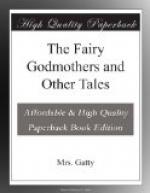Not at all so: only you travel too fast; by which I mean you speak too hastily. You learn Italian, I dare say? Oh yes, of course, for you sing. Well then, Ombra adorata that is “beloved shadow;” aspetta that is, “wait”—“wait, my beloved shadow” (of a charming young lady), give me breathing time, and I will explain myself. As you are an Italian student, I presume you have heard of the great Italian poet Dante. Now Dante in his Convito or “Banquet” tells his readers that writings may be understood, and therefore ought to be explained in four different senses or meanings. There is first the literal sense; secondly, the allegorical; thirdly, the moral; and fourthly, the anagorical. Now I know you can’t explain this last word to me, for I would wager a large sum that you never tasted of Dante’s Banquet—no, not so much as the smallest crumb from it; and therefore how should you know what he means by the anagorical sense? Give me leave to have the honour of enlightening you, then. The anagorical is what the dictionaries call the anagogical sense. A sense beyond this world; a sense above the senses; a spiritual sense making common things divine. It is hard to be arrived at and difficult of comprehension. Now in the matter of the nice little boy’s question about the Giant and the carraway seed, (for none but a nice little boy could have excogitated any thing so comical), I have set my heart upon talking to you about it in the four above mentioned senses. And having already descanted on the literal sense, I had just made an assertion which appertained to the allegorical sense, when you so inopportunely interrupted me, My Ombra Adorata, with your sharp observation about nonsense: so now we will go on in peace and quietness, if you please.
In an allegorical sense the world is full of giants who cannot see carraway seeds.
For what are Giants but great men and great women? and the world abounds with people who consider themselves as belonging to that class. And a great many of them—Giants of Cleverness, Giants of Riches, Giants of Rank—Giants of I know not how many things besides, who are walking about the world every day, very often feel themselves to be quite raised above the point of attending to trifles; so that you see I may (in an allegorical sense) say strictly of them that they cannot see carraway seeds. Oh my dears, however elevated you may be, or may become; however great or rich or learned, beware, I pray you, of being a Giant who cannot see a carraway seed!
For, as my explanation of the moral sense now goes on to show you; it is so far from being, as these Giants suppose, a proof of their superiority that they cannot see or notice things they consider beneath them—that it is, in fact, an evidence of some imperfection or defect in either their moral or intellectual structure. Just as it is a proof of our eyes being imperfect, that we cannot see the




